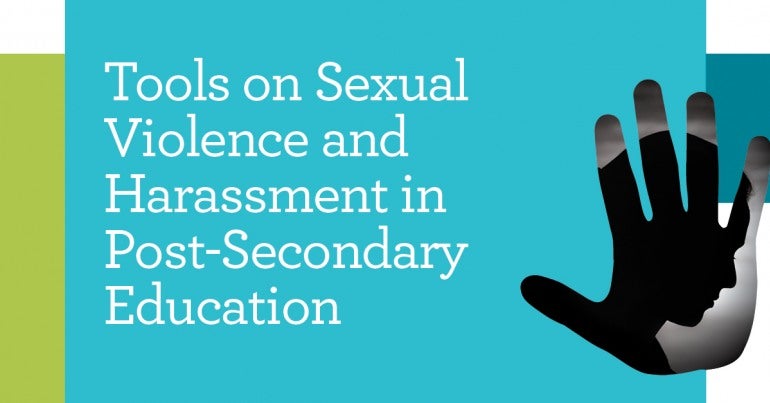 Sexual violence is any act – whether the act is threatened, attempted or carried out – that targets a person’s sexuality, gender expression, or gender identity without their consent. Sexual violence is a serious matter and affects all members of the campus community. We all have a role to play in preventing and responding to sexual violence and harassment.
Sexual violence is any act – whether the act is threatened, attempted or carried out – that targets a person’s sexuality, gender expression, or gender identity without their consent. Sexual violence is a serious matter and affects all members of the campus community. We all have a role to play in preventing and responding to sexual violence and harassment.
Prevention
Our campus communities should be safe, healthy places for all students, workers, and visitors. You can help in cultivating a culture of respect and consent.
- Treat people around you as equals and respect their boundaries. Ask for consent before you touch someone else, even just to give a hug.
- Call out behaviour that diminishes or demeans someone else and encourage others to do the same.
- If you see inappropriate behaviour, report it or intervene by asking innocuous questions to distract the perpetrator.
- If you are aware of problematic behaviour, areas on campus that are not safe, or policies and practices that could leave people vulnerable to sexual violence and harassment, report them to your steward, your employer, or your Joint Health and Safety Committee.
- Participate in training on consent, gender-based violence, and bystander intervention through your local union or your employer and apply what you have learned.
What to do if you experience sexual violence or harassment
Telling your story
Your experience is your own; there is no wrong person to share it with and no one with whom you have to share it if you don’t want to. You may wish to tell a trusted friend or co-worker. You can also speak with your union steward or a member of your local executive. They can help you to access supports and to understand what your options are. Telling your local steward or an executive member does not mean that you have to file a grievance or official report.
Accessing supports
You do not need to file an official report, grievance, or police complaint in order to access supports. Your institution’s sexual violence response and prevention coordinator or office can direct you to supportive services on and off-campus, including counselling, medical care, and legal services. They can also help you obtain academic accommodations, such as changing course sections, dropping a class without penalty, or delaying an exam or paper.
Your local union can help you negotiate workplace accommodations, including time off work to obtain supportive services, participate in the investigation, or change housing. Other accommodations could include a change in work hours or assignment for you or for the person who has caused you harm.
Options for reporting
If you do wish to officially report what has happened to you and seek some measure of resolution or justice, you have multiple options, depending on where the incident(s) occurred, what your institution’s policy says, who the perpetrator is, and whether your employer is the post-secondary institution or a third party contractor.
These processes are not all mutually exclusive and in many instances, you can change your mind if you decide that a process is not working for you. There are some cases, however, where your employer is required to conduct an investigation or to report information to the police. You still have a choice whether to participate in the investigation or not in these cases.
The options for reporting and responding to an incident of sexual violence or harassment at a university or college include:
- A complaint under your institution’s sexual violence and harassment policy;
- Alternative resolution measures such as restorative justice practices or an apology;
- A workplace grievance;
- A workplace health and safety complaint;
- A CUPE Trial Procedure complaint;
- A complaint to a professional regulatory body;
- A human rights complaint;
- A criminal complaint.
For more information on these options, speak to your local union steward or an executive member. You might also wish to contact the office or person responsible for responding to sexual violence and harassment on your campus.
What to do if someone else discloses an experience of sexual violence or harassment
A survivor of sexual violence and harassment may choose to share their story with you because they trust you. It is important to respond with empathy and compassion. Be careful not to use language that suggests doubt, blame, or judgment. Instead, mirror the language that is used by the person who is sharing their story. Ask for clarifications where necessary, but do not ask them to share more of their story than they are comfortable with.
Know what your obligations are under your institution’s sexual violence and harassment policy. Usually, the policy requires you to refer the survivor to the policy and to direct them to the coordinator or office in charge of sexual violence prevention and response for support.
Ask the person what their expectations are for confidentiality. Is it okay if you share this information with your employer or local steward? If they say no, do not share the information with anyone unless you have a legal obligation to report (because someone is underage, for example). If you are not sure what your obligations are, you can share information without disclosing any identifying information with your steward to seek advice.
This information is provided for educational purposes only and does not constitute legal advice. For further information and assistance, please contact your National Representative.




